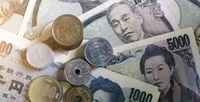Tokyo, April 16 – Rice prices across Japan continue to soar despite government efforts to stabilize the market by releasing approximately 210,000 tons of rice from stockpiles last month. The Ministry of Agriculture's move aims to lower prices, but it may take until the end of April for the rice to be distributed nationwide. Currently, the average retail price of a 5-kilogram bag of Thai fragrant rice in supermarkets is around 4,206 yen, equivalent to approximately 990 baht. This price is more than double what it was during the same period last year, and experts warn that even with the distribution of additional rice, it may not be enough to meet the growing demand for stockpiling among consumers.
The continuous rise in rice prices has been attributed to various factors, including a decline in agricultural production due to extreme weather conditions. Since summer 2024, the cost of rice in Japan has surged, prompting some consumers to hoard rice, which has led to widespread shortages in the market. As a result, many believe that rice prices may not see significant decreases in the near future.
“The average price for rice is still high, and even with the government’s intervention, we may not return to previous price levels anytime soon,” said an industry expert. Concerns over production costs and climate change impacts are at the forefront of this issue.
In a related economic update, the exchange rate for the Japanese Yen has also been a topic of discussion. On April 16, 2025, several banks reported varying rates for the Yen against the Vietnamese Dong. For instance, Vietcombank’s buying rate was 174.55 VND/JPY, while the selling rate was 185.64 VND/JPY. Meanwhile, Vietinbank reported buying and selling rates of 176.50 VND/JPY and 186.20 VND/JPY, respectively.
BIDV's rates were slightly higher at 177.21 VND/JPY for buying and 185.49 VND/JPY for selling. Agribank followed closely with rates of 176.64 VND/JPY for buying and 184.75 VND/JPY for selling. Eximbank, Sacombank, and Techcombank also reported their respective rates, with Eximbank offering 177.94 VND/JPY for buying and 184.51 VND/JPY for selling.
HSBC's rates were noted as 175.71 VND/JPY for buying and 183.46 VND/JPY for selling, while NCB had rates of 175.22 VND/JPY for buying and 185.58 VND/JPY for selling. In the black market, the exchange rate for the Yen was reported at 180.19 VND/JPY for buying and 181.19 VND/JPY for selling.
According to a survey conducted by Cong Thuong Newspaper, the average exchange rate for the Yen on April 16, 2025, at 06:00 AM was recorded as 176.22 VND/JPY for buying and 185.54 VND/JPY for selling. This reflects a notable increase of approximately 5.5% since the beginning of April. Economists suggest that the Bank of Japan (BoJ) may continue to raise interest rates, contributing to the Yen's stability amidst rising wages in various Japanese companies.
As the economic landscape evolves, experts remain cautious about the future trajectory of the Yen's value. While stability is preferred, there are concerns that it may not increase significantly. The volatility surrounding the Yen's exchange rate has raised eyebrows, prompting discussions about potential interventions by the State Bank to stabilize the currency.
In light of these developments, various currency exchange shops in Hanoi and Ho Chi Minh City have become popular spots for individuals looking to exchange currencies. Notable locations include Quoc Trinh Ha Trung, located at 27 Ha Trung, Hang Bong, Hoan Kiem, Hanoi, and other well-known shops across the cities.
As Japan grapples with rising rice prices and fluctuating currency rates, the economic implications are significant. The government’s interventions may provide temporary relief, but the long-term outlook remains uncertain. Consumers and businesses alike will be watching closely to see how these factors unfold in the coming months.
The intersection of agricultural challenges and currency fluctuations paints a complex picture of Japan's economic situation as it seeks to navigate these turbulent waters.






